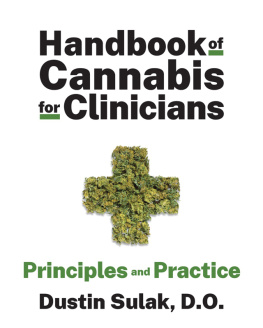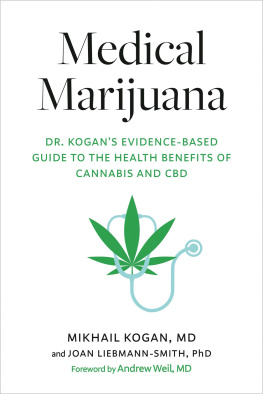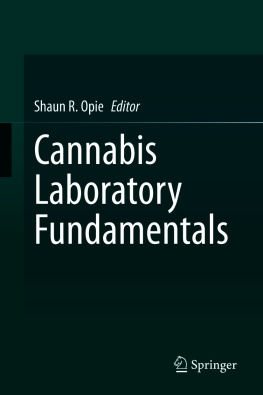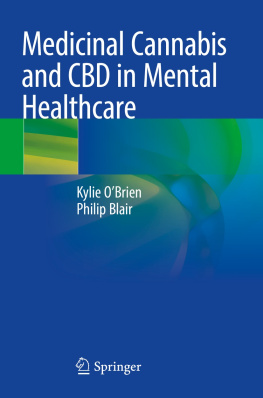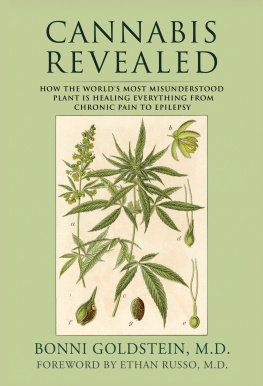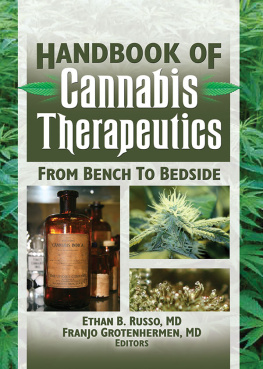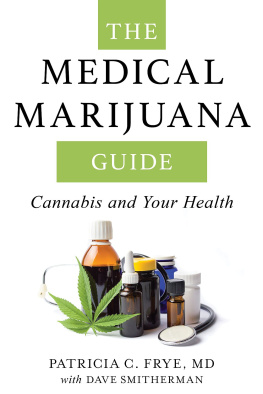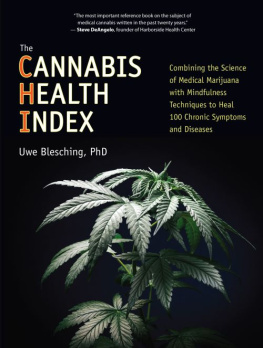Contents
Guide

A Norton Professional Book
Handbook of
Cannabis
for Clinicians
Principles and Practice
Dustin Sulak, D.O.

This book is dedicated to all of our patients.
Contents
It is both an honor and a pleasure to provide brief commentary on this exemplary book. While it is true that recent times have produced numerous excellent tomes on the subject of cannabis and its medical uses, Dustin Sulak has produced a detailed and scientifically accurate guide specifically geared toward the practicing physician who seeks to understand the history of cannabis in medicine, its foundations in an understanding of the endocannabinoid system that modulates human physiology, the pharmacological effects of its myriad cannabinoid and terpenoid components, their various preparations, and specific effects and contributions to combating various afflictions. Along the way in the narrative and its short discrete chapters, there are appropriate mentions of the necessary pitfalls and caveats a clinician in the trenches requires when embarking on care of patients with unfamiliar treatment modalities. Embarking on an understanding of the science of cannabis and the endocannabinoid system is clearly not for the dilettante nor for the faint of heart, but for the committed student of these disciplines, there can be few better guides than this one, which is at once lucid and practical.
Authors of scientific literature face a constant challenge in the need to present technical material in a palatable manner and must choose between a strict didactic approach versus one in which the personal touch remains clear. To my delight, and to the advantage of his readers, Dustin has peppered his text with plenty of examples of his extensive experience in applied therapeutics, not merely confined to cannabis medicine but incorporating his eclectic learning and training in the healing arts. Thus, his personality shines through the words and imparted wisdom. It has been my good fortune to know Dustin over the course of a decade, to travel with him, and to meet his wonderful extended family. I have seen him hold a huge hall of conference attendees at rapt attention, hanging on every word, and witnessed him holding court in a spontaneous impromptu yoga class of high school seniors on spring break on a Caribbean beach. I have delighted in the range and depth of his knowledge of esoteric therapeutic disciplines and obscure treatments that I encountered only after many decades of study.
Rather than wax prosaic on my own opinions on the folly of continued prohibitions on cannabis and existing roadblocks to its research, I would opt for the path of brevity here and urge the reader to press ahead to more rewarding pursuits by pushing on into this book itself. At the time of this writing, the cannabis community is mourning the passing of Lester Grinspoon, MD, one of the guiding lights of cannabis medicine. In the academic world it is often stated that we gain our knowledge by standing on the shoulders of giants. In Dustin Sulak we have another such giant, a worthy successor, at once a gifted clinician and marvelous teacher. May you be enriched by the knowledge you are about to acquire!
Ethan Russo, MD
Founder and CEO, CReDO Science
June 2020
Thank you to my patients, who have taught me the most about cannabis, intimately shared their journeys, and supported my family throughout the writing of this book.
Thank you to my beloved mentors, who gave me the confidence to follow my alternative path in medicine and who model dedication to service and teaching, open-minded yet scientific thinking, ethics, leadership, professionalism, and generosity: Rabbi Nathan Segal; Andrew Weil, MD; John McPartland, DO; Ethan Russo, MD; Jeff Hergenrather, MD; and James Jealous, DO.
Thank you to the hundreds of researchers cited in this book, the institutions that made their work possible, and the human and animal subjects who have collectively created a vast body of evidence that has guided and supported my work on the uncertain front lines of cannabis medicine. Thank you to Sci-Hub for removing barriers to scientific knowledge and making this project possible.
Thank you to my children, Arwen, Isabelle, and Samuel, for inspiring me to be my best, for understanding my dedication to this work, and for the hundreds of brief writing interruptions that filled my heart with love and my vision with beauty.
Thank you to my parents, Karen and Craig, for unconditionally supporting my work with cannabis since its beginning and comforting me in times of stress, and to my brothers and brother-in-law, Clayton, Shawn, and Brad, for joining me in this field and greatly contributing to my success.
My deepest gratitude to my wife, Danielle, for supporting this project and me at every level, including keeping me full of love and inspiration, caring for our children, caring for our clinic, understanding the subject matter and the audience, and organizing and editing the manuscript. We make an incredible team.
Thank you to the patients, parents, growers, and distributors who have risked or suffered criminal penalties by serving the health-care needs of their families and communities. Your sacrifices have helped countless others.
Thank you to cannabis, an extraordinary plant, teacher, healer, and metaphor, for taking me on this journey and empowering me to be of greater service to patients and clinicians.
Handbook of
Cannabis
for Clinicians
A 54-YEAR-OLD MAN with failed back surgery syndrome returns to the office for his first 3-month follow-up visit having tapered and discontinued 60 mg of oxycodone daily, reporting less pain and better function. A 2-year-old girl with Krabbe disease, an inherited demyelinating disorder, who had spent most of her life screaming and grimacing, returns in a calm state with a slight smile on her face. A 48-year-old woman with multiple sclerosis offers to donate her walker to another patient because she does not need it anymore. An 11-year-old boy with autism stops putting his head through walls and other forms of self-injury and is now able to attend school. A 32-year-old woman with severe posttraumatic stress disorder sleeps through the night without a nightmare for the first time in over a decade.
While we may collect a few stories like this in our careers, not many clinicians see these results on a daily basis. In the last 11 years of clinical practice with cannabis, remarkable success in highly refractory patients has become the norm, not the exception. Not everyone responds to cannabis, and some that do receive only modest benefits, but after seeing what I have seen, I can hardly imagine practicing medicine without this tool. I know that I would be forced to rely on more dangerous and less effective treatments for my patients, and I would see life-changing results much less frequently.
Despite its nearly 5,000 years of recorded use as a medicine and its impressive versatility, efficacy, and safety, Cannabis sativa has existed outside the modern pharmacopeia since the 1940s. Primarily driven by popular demand, this botanical medicine has returned to health care, and now clinicians are seeking the essential knowledge required to identify candidates for treatment, guide dosing, maximize therapeutic benefit, and mi nimize harm.
Unlike most emerging medical therapies, which follow a traditional bench-to-bedside path through development, approval, and implementation in the clinical setting, the widespread public use of medical cannabis has preceded rigorous modern validation and clinical education. Medical school and residency curricula, in fact, continue to uphold the institutional bias that has challenged cannabinoid medicine for decades, often failing to even mention the plant or its mechanisms of action.

